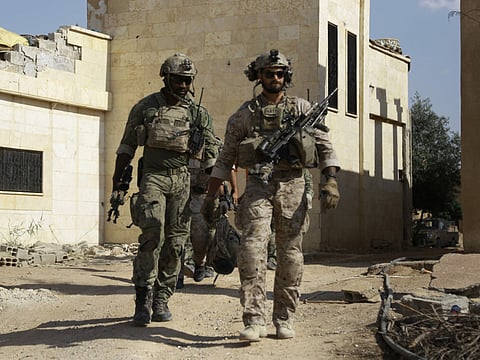Syrian army thrusts into Raqqa
Undeclared coordination between Washington and Moscow appear to be in play as SDF forces also advance

Beirut: Russian-backed Syrian troops pushed into Daesh’s bastion province of Raqqa on Saturday, threatening to catch the terrorists in a pincer movement as US-backed Kurdish-led fighters advance from the north.
The lightning advance from the southwest with Russian air support brought the army to within 40km of the Euphrates Valley town of Tabqa, site of the country’s biggest dam, the Syrian Observatory of Human Rights said.
The dam, 40km upstream from Daesh’s de facto Syrian capital Raqqa city, is also the target of the Washington-backed offensive which Kurdish-led fighters launched late last month.
It was the first time that government troops had entered Raqqa province since they were ousted by Daesh militants in August 2014.
Regular army troops were backed by militia newly trained by the regime’s ally Russia, Observatory director Rami Abdul Rahman told AFP.
He said that the twin offensives which threaten to cut off Daesh-held Raqqa from Daesh-held territory along the Turkish border raised suspicions that Moscow and Washington were covertly coordinating operations by their respective Syrian allies.
“It seems there has been an undeclared coordination between Washington and Moscow,” he said.
At least 26 Daesh militants and nine government troops and militia were killed in the army’s advance, according to the Britain-based Observatory, which relies on reports from medics and activists on the ground.
Tabqa dam has a huge reservoir named Lake Assad after President Bashar Al Assad’s late father and predecessor Hafez.
When Daesh overran the area with its garrison and airbase in 2014, it summarily executed 160 captured regime troops.
Daesh militants are facing counter-attacks on multiple fronts.
Arab and Kurdish fighters backed by Washington have launched an assault on the strategic Manbij pocket further up the Euphrates on the Turkish border, regarded as a key entry point for foreign Daesh militants.
Hundreds of kilometres downstream in neighbouring Iraq, elite Iraq troops have launched an assault on the emblematic Daesh bastion of Fallujah.
Washington has deployed more than 200 special forces troops in support of the Kurdish-led Syrian Democratic Forces, which it regards as the most effective fighting force on the ground against Daesh in Syria.
The SDF controls a large swathe of northeastern Syria along the Turkish border and another border enclave in the northwest.
The SDF’s offensive against the Manbij pocket is aimed at seizing the last stretch of border still under Daesh control and denying Daesh militants any opportunity to smuggle in recruits and funds.
The US military said the assault had captured more than 100 square kilometres of territory from Daesh this week.
Daesh has hit back with an offensive against two towns held by non-Daesh rebels further west in a bid to enlarge the territory it holds on the border.
Washington has dropped ammunition to the rebels defending the town of Marea in a bid to stop Daesh overrunning it, a US official confirmed.
The supply lines from neighbouring Turkey have made the northern border region one of the most contested battlegrounds of Syria’s five-year-civil war.
The region is now controlled by a myriad of rival armed groups, although Daesh and the SDF have put other rebel groups on the back foot.
Washington’s support for the SDF has strained relations with Nato ally Ankara as its largest component is the Kurdish People’s Protection Units (YPG).
Ankara regards the YPG as an arm of the Kurdistan Workers Party (PKK) which has fought a three-decade insurgency against the Turkish state.
Sign up for the Daily Briefing
Get the latest news and updates straight to your inbox


